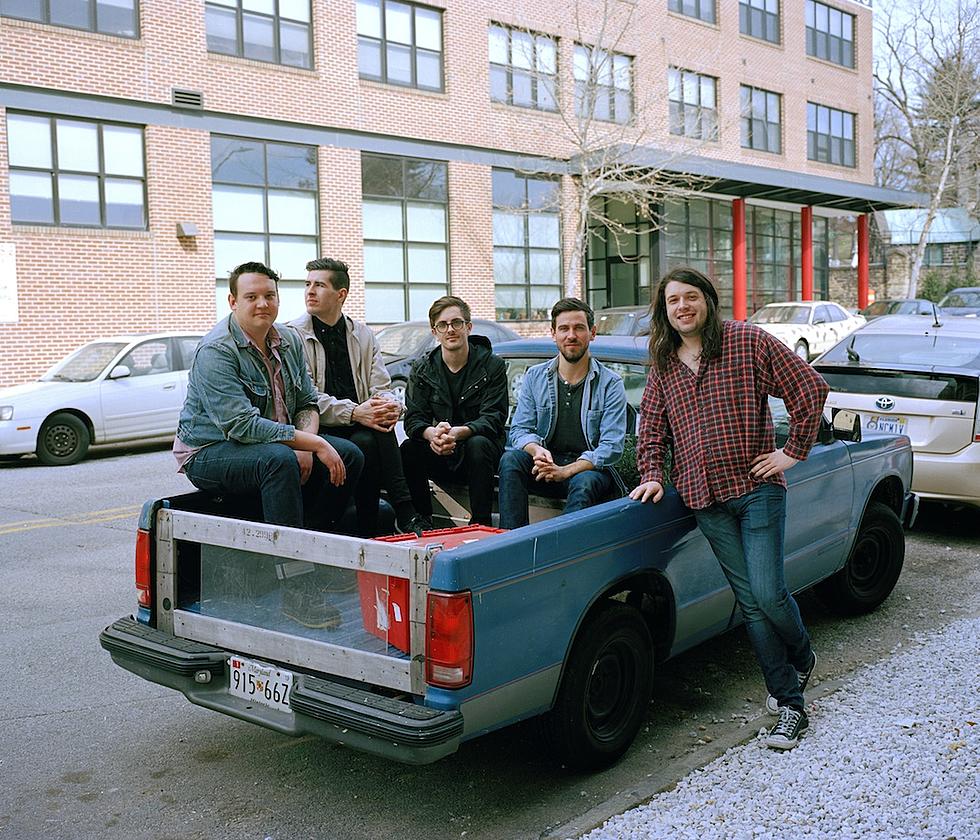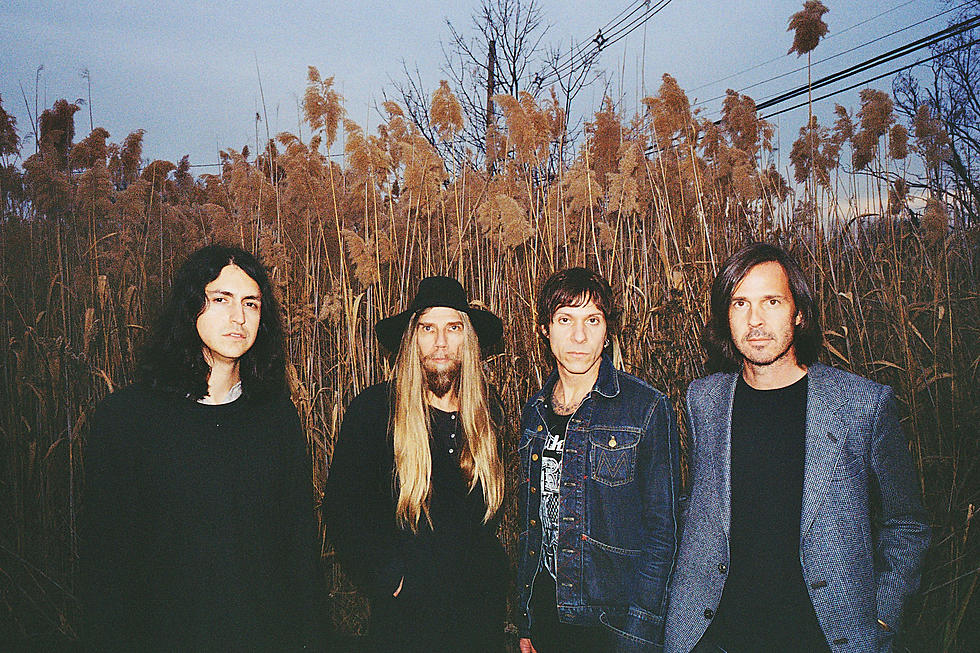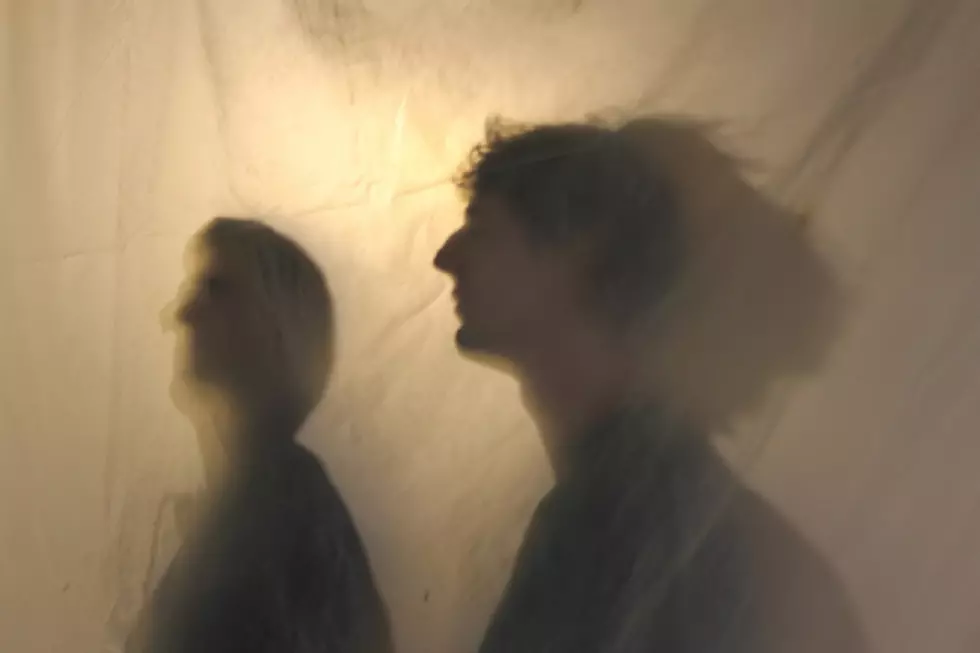
He Is Legend Draw Their Line in the ‘Sand’
He Is Legend should be your dream band. Formed in 2003, they've long mixed the unbridled chaos of post-hardcore's earlier days with alt-rock and doom, à la Goatsnake and Alice and Chains. After a short hiatus in 2009, the band returned with 2014's Heavy Fruit, a record mixing psychedelia and metallic textures. They pulled off trippy, six-minute experimental journeys as easily as they did radio-ready hard rock jammers.
HIL are preparing to release their newest record, few, via Spinefarm in late April. Recorded at an isolated North Carolina cabin, the album features some of the band's darkest and, conversely, most hopeful songs yet. Today you can hear "Sand," a good example of what to expect from the entire package. The southern-fried edge from their earlier work complements the plumes of melody, making for a perfect dichotomy.
We spoke to singer Schuylar Croom about few, North Carolina, trap music and realizing that there's no man behind the curtain.
How did growing up in North Carolina influence you?
It’s interesting — me as a vocalist, I guess I grew up playing drums for my mom and my stepdad. They were in this southern Baptist gospel band, and I played drums for them for a while. Every Saturday and Sunday, we’d be in a different rural town — very weird, small backwoods church kind of [places]. That was probably [age] 15, 16, somewhere around there. It’s interesting to see that kind of walk of life and to be around it so much, and me doing something for my folks, and being into heavy metal and stuff like that, being judged by that crowd. North Carolina has a hold on it; there’s a church on every corner.
Was that a hard thing to navigate as a kid? Do you feel any connection to that anymore?
No, I don’t feel any connection to it anymore. I think as a kid it was more where I was being led. It was important to my mother — she’s a saint, you know? It’s still pretty important to her, so I’d never try to take it away from her. But for me, I think it was a really clear, easy cut. When someone pulls the curtain back and you see someone moving the pedals [with] their feet, it’s not hard to run away from it. For a lot of people, there’s more to it than that. For them, it’s not their religion — it’s their job and girlfriend, where they eat.
It becomes an entire framework of their social life, everything they do.
Yeah, I don’t fault people for that either, but for me, and I think with Adam [Tanbouz, guitarist], he grew up in kind of the same situation. But he’s from Jordan; he’s Middle Eastern and grew up with similar things, although it was a lot different for him. Our childhoods were all different, y’know? We started touring fresh outta high school. I think when it was time to start making music on our own, it was something we knew we could do well and wanted to kind of do together. But yeah, I think it’s easier for people our age maybe, and it’s probably getting easier for kids now to notice and make a clean break. It is a part of life and where we were at the time. I think it’s getting simpler to realize what it’s doing to you and your family.
It’s a weird thing to contextualize sometimes — looking back at what was in the media in the '90s, seeing these talk shows and legitimate fear from parents worrying about their kids not following God, and that sort of thing.
I remember watching the interview with Marilyn Manson on The Phil Donahue Show, just talking about heavy metal as a whole and how your kids are slam-dancing, like, “Why would they want to do this to their bodies?” It’s just lost in translation, just like our grandparents or whatever were persecuted by listening to Elvis. And that was sexy; they wouldn’t show him below the waist on The Ed Sullivan Show. I think it shows you [that] being persecuted as an artist is a matter of being lost in translation. Someone says it’s bad, so you agree, and your friend agrees, and everyone gets behind the terribleness of what it is. But yeah, that is what it was like.
It’s hard to still see rock music as radical, at times. Do you try and find ways to make your band’s music dangerous?
Yeah, I think Adam writes dangerous sounds. The music always has a sharp edge. For me, I always wanted to write like a storyteller. I grew up just loving Tom Waits and Nick Cave, classic shit, the Beatles and the Stones. I’ve always had a love for that style of rock 'n' roll. But yeah, I do try to put a dangerous edge on where the lyrics go. But it’s always been like that from a writing perspective. Our fans, I think, kind of expect it now that the next record will sound a little different than the last, which, at first, people weren’t really into. But I think our fans over the ages have come to respect what we do, because we change and things are different than even when we wrote Heavy Fruit.
Do you think there are elements of occult influence in your music?
It’s a subject I like to breach. I don’t really talk much about what I know or don’t know, just 'cause it feels like the wrong thing to do. But I’ve been reading esoteric shit for a long time, and maybe thwart accusations through some things like that. I write things I’m interested in as well — like you said in the beginning of the interview — to push a kind of scare to people who aren’t familiar with it. Of course, I do believe you can change the course of your life with your mind; it’s just a matter of how you get there. All esoteric, occult knowledge is mainly the path inside you, which is hard to put into words. I’ve done that, definitely, in the past; I wouldn’t necessarily use the word "occult." But there is that element that I think all rock 'n' roll musicians have gotten into at one point; there’s truth in a lot of that. There’s a lot of elements to black magic [that] people don’t understand, and walking on eggshells around them in music is fun.
Do you remember what originally attracted you to it?
I think I’ve been attracted to that idea since I was a kid. When a certain group of people tell you Jars of Clay is a good substitute for Marilyn Manson or the Smashing Pumpkins, you quickly realize you’re talking to fools. Even in literature, everything has to be “stamped” by the church. If there isn’t a Judeo-Christian undertone, it’s bad. That’s where it started for me. Like, the Bible’s pretty weird. Of course, when you start doing drugs, I think everyone has that moment where they start diving into conspiracy; it’d be easy to start reading David Icke books and start thinking about reptilians, or you go the other way and read about the Golden Dawn and look into our past. I mean, you can read the Bhagavad Gita and it’s like the first sci-fi book. It all had a trickle-down effect for me, finding writers like Aleister Crowley and Israel Regardie, reading those things and realizing, “Oh, this isn’t a book about creation; it’s about how to shed your life and it’s a code of ethics.” None of which I can say I’ve really ... I mean, it takes years and years to devote your life to that, to have that kind of influence. I’ve always loved reading things like that, always had friends who would turn me onto different things — read this, watch that.
It’s exciting to see how other cultures and religions interpret something like a greater energy outside of ourselves. It’s hard to imagine it’s such a static thing, like it can only come from one book or one God. I think if you’re at a show, it will feel like you’re tapping into that in some form. I get the same feeling or intangible thing hearing a particular song that I do listening to an Alan Watts talk.
I totally feel you. I have been at certain things — I saw Tom Waits in 2004. I felt that in-the-presence-of-a-god kind of thing. You’re watching something you’re not supposed to and feeling this way or that way because you’ve tied emotions to this person for so long. That intangible thing that they do with a deity and telling you it’s them inside of you calling is even more proof that what is inside of you can call out to you — that’s what it is. It’s your own essence and energy; other people have energies, and there’s so many theories about that alone. Like, you don’t exist right now — you only exist to me because we’ve connected in one way or another through whatever link in time, but the second I hang up this phone, you as a person disappear in my "program." I love silly things like that.
Going to few, I think one of the things I’ve enjoyed is seeing the band’s style expand from the I Am Hollywood days. There were a lot of moments on the record where you guys kind of just jam and let things develop, like on "The Garden."
That was our attempt at what trap music would sound like if it were heavy metal, just because the hi-hats are so loose, very strategically placed, and the riff itself is ominous. [It] reminds me of, like, a Gucci Mane or Future or Young Thug kind of song at first; it can easily be rapped over, I think.
Did you find that you were pushing yourself vocally on the album? I think your harmonizing sounds better, and you’ve brought back a lot of the yelling from prior albums.
I have a hard time knowing what the music sounds like after my vocals are on it. I’m very critical about what it sounds like after I’m done. I’m basically looking for approval from everyone in the band that I didn’t fuck it up. This time in the studio was taxing for sure, but I never felt like I was pushing myself to do one thing or another; it was just following what I heard in my head. I don’t think it was ever a matter of me pushing or going too hard. I didn’t have the input I maybe needed, so it was like, “Okay, whatever you do is what it is.” There’s a thousand different ways — each song can go in any direction, so I’d often take the first idea and kind of trash it, work on my second idea, and I’ve kind of always done that. Whatever vocal idea would pop in my head, I’d work as far away from that as possible. But yeah, there’s certain things — a song like "Air Raid," that chorus has to be, like, Metallica-heavy. It’s the only thing that’s called for. I think I got a little frustrated doing vocals at times, but it was never "this has to be one way or another way." I think it was just what I heard my first couple of listens to the track, and then taking the track to the cabin that night, reworking it, drinking wine, reflecting with the song. But yeah, it was very daunting.
In the most broad way, what does rock 'n' roll mean to you?
I mean, it’s the ultimate line in the sand between narcissism and art. I think it started as this crazy expression of what was going on in the times, and I think it’s getting back to that. Less the way about the way you look and the way you carry yourself or whatever, and more about what’s actually happening in the world. I think we’re coming to terms with that now, with the way the world is. I think there’s a lot of bands coming together to put that out there. I mean, I never wanted to be one to play politics in it. I think that’s why He Is Legend has always been a band for bands. We take pride in our music and our live show; we don’t use tricks. Going down that direction, it hasn’t ruined rock per se, because I don’t think kids know it’s going on a lot, but you see that music and [you're aware of] scrims and fire, and all that shit bands have for an emotive response. We’ve never been that; we’ve always just been amps, drums, vocals and a good time. I think for me, that’s rock 'n' roll — you display your talent. It’s all we have as a band. It’s what we do best: We play live and try to do that without all these little crutches.
That is a broad, deep question. I think rock 'n' roll has changed, but it’s making a comeback in a way that people didn’t expect to see. In the indie circuit, there’s bands killing it and doing it perfectly, like Kurt Vile and Mac DeMarco and these bands that are true rock 'n' roll bands. Bands like Highly Suspect, we played with them a couple years ago at South by Southwest. Seeing a three-piece fucking shredding it, and now [they're] on the radio, it gives hope to guys like us who have seen the shit side of music that you hide behind a computer and play a part. I think that’s coming to an end. No guff to bands that do it that way — it’s just something we’ve never wanted to do. I think old-fashioned work ethic in rock 'n' roll is coming back because it has to — it’s all cyclical. If it wasn’t, we wouldn’t be doing what we’re doing; this would all go by the wayside. But I do think bands like Pantera and Nirvana, that energy is always going to live on with people like us who admire it and love it and couldn’t live without it.
You guys were always out of place before the hiatus. I’ve seen you with From First to Last and Drop Dead, Gorgeous, and it was a fun time, but it’s nice to see that the negatives of that scene are gone and bands are doing it for real now.
That was the reason why we had the hiatus. We weren’t getting our point across. Yeah, when we’re playing with one of those bands, those shows were fun, but it wasn’t where we should have been. We should’ve been opening for Deftones or something like that. I feel like we sit better in that genre more than what those other bands were. We just realized halfway through our tour that things weren’t going to change unless we did something kind of drastic and put our foot down. We burned a lot of bridges from doing that, but it was kind of necessary, I think. The people that are still upset from that, there was no way out — like, “OK, you’re going to play with this breakdown band,” and it was tough to not get lost in that shuffle. Then when your fans are like, “Why are you on this tour with that band?” it’s like, “Well, let me explain how the music industry works.” You can’t do that. But yeah, up until that hiatus, that was our thought process, too: We were being put into the wrong places.
I think things have changed now. We’ve found our wheelhouse, especially with this record. We’re seeing a lot of cool, positive things happening, which is what we need, and seeing things lining up, waiting for the last shoe to drop. Us sitting there like, “This is going to be awesome; this will actually be a cool album cycle and things will happen” — you feel that energy before it starts happening, which is the most important thing. Especially for bands like us who rely on our fans to keep us moving. I’m really stoked for the future. We’re in a better spot than we’ve been in ages, and we only have the fans to thank for that. Especially with the crowd-funding thing — they let us know they wanted us to continue, so we have to keep going for that.
More From CLRVYNT









